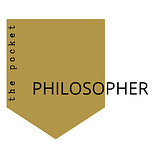Today at a Glance:
Christianity was on the brink of extinction, then the Roman Emperor adopted and spread the faith (albeit with force.)
St. Augustine was an early theologian working to unify the philosophy of “christandom”—the faith of the new Roman Empire and the Roman Catholicism.
Augustine’s Epistemology, Ethics, and Ontology united Plato and Christianity forever
Philosophers,
Welcome to day 4 of our two-week series: Philosophy Crash Course.
Today, we’re bringing it full circle as we study St. Augustine of Hippo.
I say full circle because the debate we studied on our first day between Aristotle and Plato—the world of imagined forms vs. the world of science, biology, and observation—was a tension which persisted in philosophy and Christian theology from Jesus to the Byzantine Empire.
Let’s dig in and see where we end up!
First, a quick history recap:
For the first 300 years of Christianity, it was historically what we would label a “death and resurrection cult.” Not cult in the modern day use of the word, but as a historical entity. It was common for emperors, leaders, and famous people to have cults established in their honor immediately after their death to maintain their legacy and memory.
The Christian cult was unique—however—because
only a few people were said to have actually known Jesus,
Jesus was not a historical figure with the reach of say an emperor, and most importantly
Jesus was Jewish and cults were a decidedly Roman practice.
All this to say, the first 300 years of Christianity was a bit abnormal. Most likely, it would have been forgotten if not for the adoption of Christianity by the emperor Constantine in the 300s AD.
The project of Constantine was to unite a swath of land that had been in disarray for nearly 3 centuries. One of the tools at his disposal was myth, story, or religion. Therefore, he crafted a myth/narrative around his direct experience with Jesus who told him to “Conquer by this”—this being the cross.
Using this story, Constantine became a Christian emperor, also being careful to infuse common “pagan” (aka non-christian) practices and ideas into this new, imperial faith. Hence, Euro-influenced societies today celebrate Christmas during the winter solstice by bringing trees into the house, and remember Easter by commemorating the resurrection of Jesus next to the fertility of rabbits and eggs (pagan rituals).
And thus we meet Augustine, one of the early philosophers tasked to make sense of this new movement, organize its ideas, and simplify its message.
Here’s what he said.
Epistemology
Thankfully for us today, these last 4 points will be simple—Augustine would have been motivated to simplify the ideas in the name of widespread adoption. His largest impulse, it would seem, was to unify his hero Plato with the last 300 years of Christian cults (the world of forms and the realms of heaven were a natural fit).
Thus, Augustine argues that we acquire knowledge ONLY in one way—by being “illuminated” by God. To put it another way, God shows us the truth, and only then can we acquire knowledge.1
Ethics
Here Augustine tips his hat to the Greeks (and very much Plato).
Like the Greeks he argues that the ethical end of life ought to be happiness and human flourishing. What is unique to this point is Augustine’s definition of happiness—which he defines as union with God.2
Using some quick deductive reasoning we ascertain that the ethical end of Augustine’s framework is to achieve union with God.
Ontology
In no uncertain terms, the object of Augustine’s study is God. In fact, I would argue that the conception of God many people hold today (singular being, male, omnipotent, somewhat fatherly) is due at least in part to Augustine’s ontological framework.3
To put it another way, this kind of big bearded guy in the sky approach to divinity could be a direct result of Augustine’s imagination.
Greatest Work
Full disclaimer, I’ve only read portions, but I’d point you to his book, The City of God.
I’m currently reading The Republic of Plato and can’t help but to wonder of City of God was written in homage to his favorite philosopher, integrating Platonism with Christianity forever.
I hope you enjoyed this crash course today friends. That’s it for our study of the Euro-centric philosophers.
Join us next week where we’ll crack open the philosophical movements of communities external to European history.
Also, make sure to check-in tomorrow for a concise weekend roundup where we’ll pull all of this together in one, easy-to-reference review.
Until then,
Matt
https://www.britannica.com/topic/epistemology/Ancient-Skepticism
https://www.britannica.com/topic/ethics-philosophy/St-Augustine
https://plato.stanford.edu/entries/augustine/














Share this post